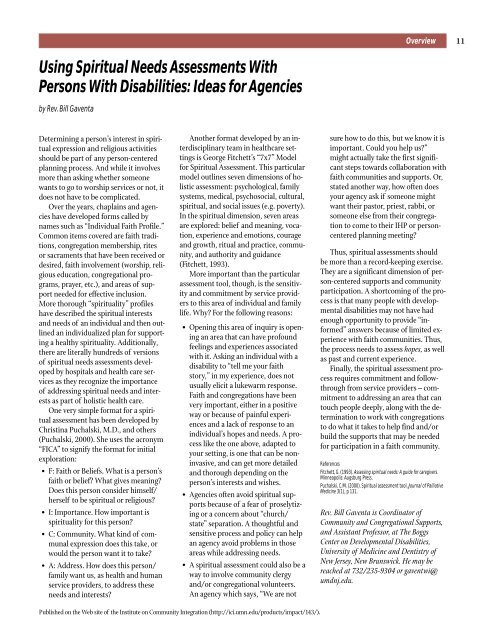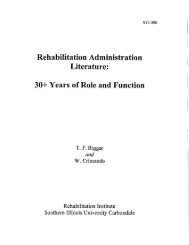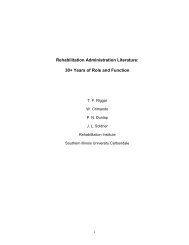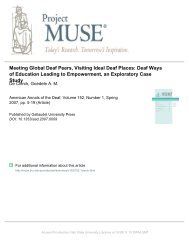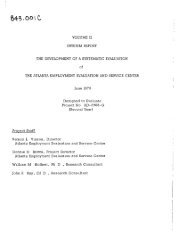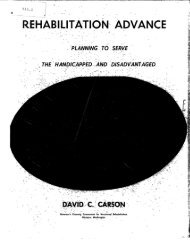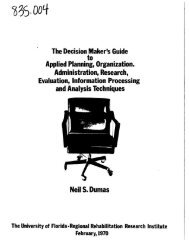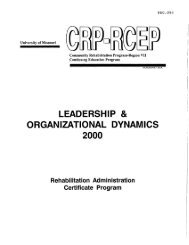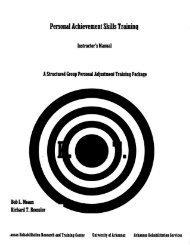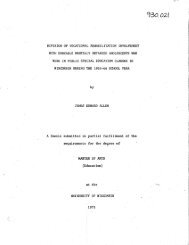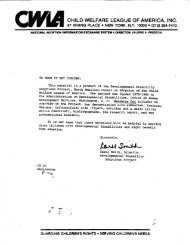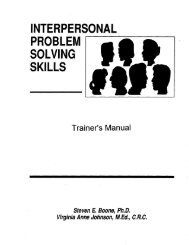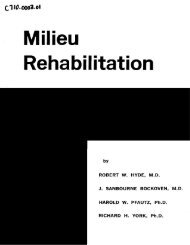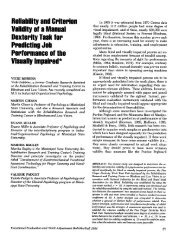Feature Issue on Faith Communities and Persons with ... - NCRTM
Feature Issue on Faith Communities and Persons with ... - NCRTM
Feature Issue on Faith Communities and Persons with ... - NCRTM
Create successful ePaper yourself
Turn your PDF publications into a flip-book with our unique Google optimized e-Paper software.
Overview<br />
11<br />
Using Spiritual Needs Assessments With<br />
Pers<strong>on</strong>s With Disabilities: Ideas for Agencies<br />
by Rev. Bill Gaventa<br />
Determining a pers<strong>on</strong>’s interest in spiritual<br />
expressi<strong>on</strong> <strong>and</strong> religious activities<br />
should be part of any pers<strong>on</strong>-centered<br />
planning process. And while it involves<br />
more than asking whether some<strong>on</strong>e<br />
wants to go to worship services or not, it<br />
does not have to be complicated.<br />
Over the years, chaplains <strong>and</strong> agencies<br />
have developed forms called by<br />
names such as “Individual <strong>Faith</strong> Profile.”<br />
Comm<strong>on</strong> items covered are faith traditi<strong>on</strong>s,<br />
c<strong>on</strong>gregati<strong>on</strong> membership, rites<br />
or sacraments that have been received or<br />
desired, faith involvement (worship, religious<br />
educati<strong>on</strong>, c<strong>on</strong>gregati<strong>on</strong>al programs,<br />
prayer, etc.), <strong>and</strong> areas of support<br />
needed for effective inclusi<strong>on</strong>.<br />
More thorough “spirituality” profiles<br />
have described the spiritual interests<br />
<strong>and</strong> needs of an individual <strong>and</strong> then outlined<br />
an individualized plan for supporting<br />
a healthy spirituality. Additi<strong>on</strong>ally,<br />
there are literally hundreds of versi<strong>on</strong>s<br />
of spiritual needs assessments developed<br />
by hospitals <strong>and</strong> health care services<br />
as they recognize the importance<br />
of addressing spiritual needs <strong>and</strong> interests<br />
as part of holistic health care.<br />
One very simple format for a spiritual<br />
assessment has been developed by<br />
Christina Puchalski, M.D., <strong>and</strong> others<br />
(Puchalski, 2000). She uses the acr<strong>on</strong>ym<br />
“FICA” to signify the format for initial<br />
explorati<strong>on</strong>:<br />
• F: <strong>Faith</strong> or Beliefs. What is a pers<strong>on</strong>’s<br />
faith or belief? What gives meaning?<br />
Does this pers<strong>on</strong> c<strong>on</strong>sider himself/<br />
herself to be spiritual or religious?<br />
• I: Importance. How important is<br />
spirituality for this pers<strong>on</strong>?<br />
• C: Community. What kind of communal<br />
expressi<strong>on</strong> does this take, or<br />
would the pers<strong>on</strong> want it to take?<br />
• A: Address. How does this pers<strong>on</strong>/<br />
family want us, as health <strong>and</strong> human<br />
service providers, to address these<br />
needs <strong>and</strong> interests?<br />
Another format developed by an interdisciplinary<br />
team in healthcare settings<br />
is George Fitchett’s “7x7” Model<br />
for Spiritual Assessment. This particular<br />
model outlines seven dimensi<strong>on</strong>s of holistic<br />
assessment: psychological, family<br />
systems, medical, psychosocial, cultural,<br />
spiritual, <strong>and</strong> social issues (e.g. poverty).<br />
In the spiritual dimensi<strong>on</strong>, seven areas<br />
are explored: belief <strong>and</strong> meaning, vocati<strong>on</strong>,<br />
experience <strong>and</strong> emoti<strong>on</strong>s, courage<br />
<strong>and</strong> growth, ritual <strong>and</strong> practice, community,<br />
<strong>and</strong> authority <strong>and</strong> guidance<br />
(Fitchett, 1993).<br />
More important than the particular<br />
assessment tool, though, is the sensitivity<br />
<strong>and</strong> commitment by service providers<br />
to this area of individual <strong>and</strong> family<br />
life. Why? For the following reas<strong>on</strong>s:<br />
• Opening this area of inquiry is opening<br />
an area that can have profound<br />
feelings <strong>and</strong> experiences associated<br />
<strong>with</strong> it. Asking an individual <strong>with</strong> a<br />
disability to “tell me your faith<br />
story,” in my experience, does not<br />
usually elicit a lukewarm resp<strong>on</strong>se.<br />
<strong>Faith</strong> <strong>and</strong> c<strong>on</strong>gregati<strong>on</strong>s have been<br />
very important, either in a positive<br />
way or because of painful experiences<br />
<strong>and</strong> a lack of resp<strong>on</strong>se to an<br />
individual’s hopes <strong>and</strong> needs. A process<br />
like the <strong>on</strong>e above, adapted to<br />
your setting, is <strong>on</strong>e that can be n<strong>on</strong>invasive,<br />
<strong>and</strong> can get more detailed<br />
<strong>and</strong> thorough depending <strong>on</strong> the<br />
pers<strong>on</strong>’s interests <strong>and</strong> wishes.<br />
• Agencies often avoid spiritual supports<br />
because of a fear of proselytizing<br />
or a c<strong>on</strong>cern about “church/<br />
state” separati<strong>on</strong>. A thoughtful <strong>and</strong><br />
sensitive process <strong>and</strong> policy can help<br />
an agency avoid problems in those<br />
areas while addressing needs.<br />
• A spiritual assessment could also be a<br />
way to involve community clergy<br />
<strong>and</strong>/or c<strong>on</strong>gregati<strong>on</strong>al volunteers.<br />
An agency which says, “We are not<br />
sure how to do this, but we know it is<br />
important. Could you help us?”<br />
might actually take the first significant<br />
steps towards collaborati<strong>on</strong> <strong>with</strong><br />
faith communities <strong>and</strong> supports. Or,<br />
stated another way, how often does<br />
your agency ask if some<strong>on</strong>e might<br />
want their pastor, priest, rabbi, or<br />
some<strong>on</strong>e else from their c<strong>on</strong>gregati<strong>on</strong><br />
to come to their IHP or pers<strong>on</strong>centered<br />
planning meeting?<br />
Thus, spiritual assessments should<br />
be more than a record-keeping exercise.<br />
They are a significant dimensi<strong>on</strong> of pers<strong>on</strong>-centered<br />
supports <strong>and</strong> community<br />
participati<strong>on</strong>. A shortcoming of the process<br />
is that many people <strong>with</strong> developmental<br />
disabilities may not have had<br />
enough opportunity to provide “informed”<br />
answers because of limited experience<br />
<strong>with</strong> faith communities. Thus,<br />
the process needs to assess hopes, as well<br />
as past <strong>and</strong> current experience.<br />
Finally, the spiritual assessment process<br />
requires commitment <strong>and</strong> followthrough<br />
from service providers – commitment<br />
to addressing an area that can<br />
touch people deeply, al<strong>on</strong>g <strong>with</strong> the determinati<strong>on</strong><br />
to work <strong>with</strong> c<strong>on</strong>gregati<strong>on</strong>s<br />
to do what it takes to help find <strong>and</strong>/or<br />
build the supports that may be needed<br />
for participati<strong>on</strong> in a faith community.<br />
References<br />
Fitchett, G. (1993). Assessing spiritual needs: A guide for caregivers.<br />
Minneapolis: Augsburg Press.<br />
Puchalski, C.M. (2000). Spiritual assessment tool. Journal of Palliative<br />
Medicine 3(1), p 131.<br />
Rev. Bill Gaventa is Coordinator of<br />
Community <strong>and</strong> C<strong>on</strong>gregati<strong>on</strong>al Supports,<br />
<strong>and</strong> Assistant Professor, at The Boggs<br />
Center <strong>on</strong> Developmental Disabilities,<br />
University of Medicine <strong>and</strong> Dentistry of<br />
New Jersey, New Brunswick. He may be<br />
reached at 732/235-9304 or gaventwi@<br />
umdnj.edu.<br />
Published <strong>on</strong> the Web site of the Institute <strong>on</strong> Community Integrati<strong>on</strong> (http://ici.umn.edu/products/impact/143/).


